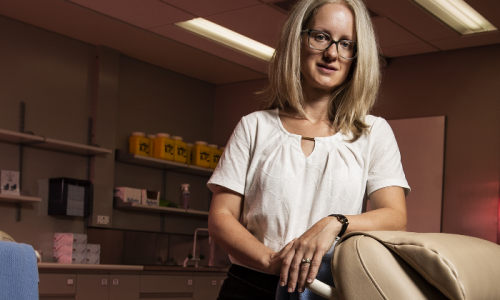- The issue dedicated six clinical articles to MS, exploring the variety of challenges that MS presents to general practitioners (GPs).
- Articles assisting GPs with clinical care included an overview of MS, diagnosing MS, disease modifying therapies (DMTs), managing walking impairments, screening and care coordination for cognition issues and understanding cognitive rehabilitation.
- Articles raising awareness of issues not commonly addressed in the community care of MS included exploring empowerment from dietary management in MS and insights into the lived experience of MS to deepen understanding and partnerships between patients and GPs.
What was the goal of the MS-themed issue?
In her editorial, Dr Sophia Samuel, Medical Editor of Australian Journal of General Practice outlined that the ideal of high-quality, patient-centred care in MS is best attained through meaningful cooperation between health-care professionals. The GP and MS care team working well together can offer a person living with MS an individualised and tailored approach to their wellbeing, she said. In this spirit, the April 2022 edition of the journal is dedicated to awareness and education around several key aspects of MS care and concentrates on recent improvements in care. These include areas such as disease modifying therapies, improvements to MS diagnosis, walking impairments, diet, cognition issues, rehabilitation, and research. Additionally, the issue focuses on understanding the lived experience of MS, with insights to help patients and GPs work better together.
What articles did the MS-themed edition include?
Firstly, an article from Dr Brett Travers and colleagues outlined the current diagnostic process in MS, modern drug therapies and factors affecting the prognosis, setting the scene around modern-day MS care and bringing GPs up to date with the many recent drug advances. This was followed by MS Australia-funded nutritionist Associate Professor Yasmine Probst and colleagues outlining the implications of dietary lifestyle management of MS in the community. The key recommendation was that people with MS follow evidence-based dietary regimes in preference to an MS-specific diet, and the importance of dietary management to building self-management and empowerment.
The impact of complex factors affecting walking was the subject of an article by physiotherapists Katrina Williams and Dr Sandra Brauer, discussing the wide range of symptoms that may impair walking, beyond the more obvious motor aspects. This includes issues with sensation and feeling, fatigue, vision, dizziness, and vertigo. The article also recommends assessment tools that might assist the GP to improve walking performance in people with MS. Neuropsychologists Dr Wendy Longley and Dr Cynthia Honan also presented a discussion on cognitive impairment in MS (memory and thinking issues), outlining the role of the GP in screening and care coordination for this common, but often overlooked symptom of MS. A discussion of the assessment tools helpful in community practice and detecting cognitive deficits preceded a discussion on the role of cognitive rehabilitation in MS. Dr Longley takes the GP through the first steps to clarify the nature of the cognition problem and then explores intervention options and future directions.
Finally, the lived experience of MS is explored by MS Australia’s Dr Therese Burke and colleagues to provide the GP with insights to guide individualised care in the community. This article discusses key trigger points for people with MS where the GP may be able to offer extra support, such as at the time of diagnosis, relapse, disease progression, pregnancy, symptom change, relationship change and decisions around medications. The article examines managing loss and uncertainty, dealing with complex and invisible symptoms, surplus suffering over and above that brought on by MS itself and maintaining health and wellness. MS Australia National Advocate, Erin Brady, explores her journey living with MS and her interactions with GPs and healthcare professionals along the way. Erin champions her positive experience with a GP; whose support, encouragement and belief helped her to really live a life with MS, not just exist.
How does this awareness help people with MS?
MS treatment and rehabilitation requires multidisciplinary care, with all providers playing an important and focused role. GPs are central to this team, often providing coordination of MS care as well as clinical expertise for all other co-existing medical conditions. The GP also plays a central role in preventative medicine and health promotion, factors of immense importance in brain health for MS. Education and awareness of modern-day treatment and advances in MS care ensure that the GP can offer high quality, current and patient-focused care.





